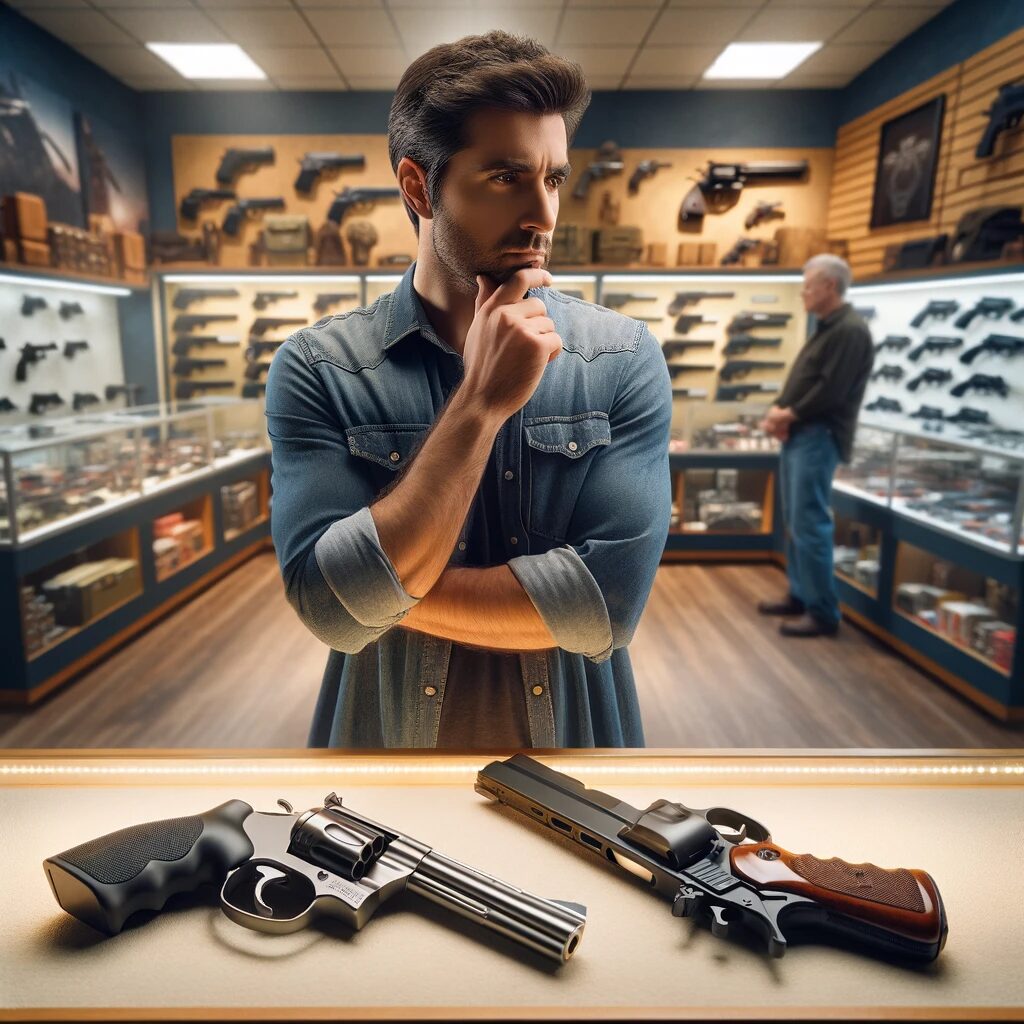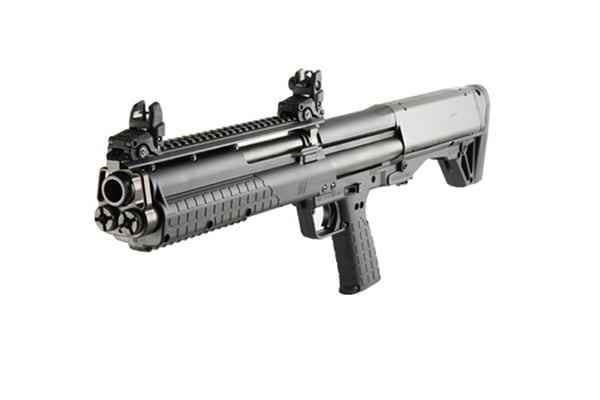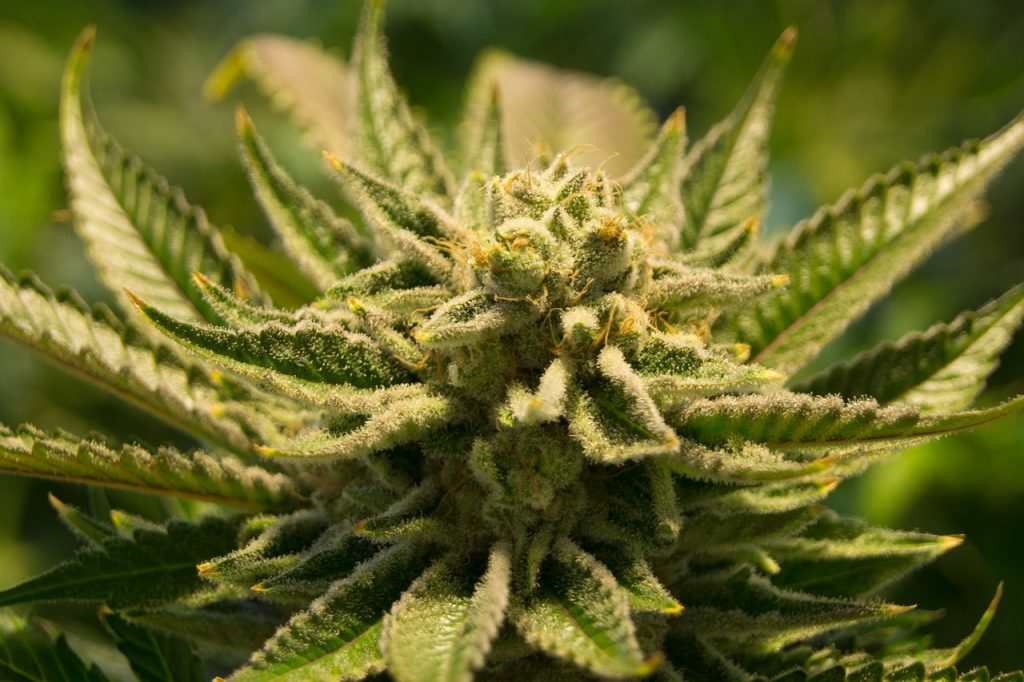Choosing a firearm for self-defense is an important decision.
With so many different types of firearms available on the market, it can be overwhelming. Factors such as personal preference, experience level, and intended use should all be taken into account.

When choosing a firearm for self-defense, consider the intended use. Will the firearm be used primarily for home defense or will you carry on a daily basis for personal protection? This will help determine the size and weight of the firearm, as well as the type of ammunition.
Another important factor to consider is personal preference. Some people may prefer the simplicity and reliability of a revolver, while others may prefer the larger magazine capacity of a semi-automatic pistol.
It is important to handle and test-fire different types of firearms to determine which one feels the most comfortable and natural to use. Taking a firearms safety course and seeking advice from experienced gun owners can also help.
Understanding Firearm Basics
Types of Firearms
When it comes to choosing a firearm for self-defense, it’s important to understand the different types available. The three main types of firearms are pistols, rifles, and shotguns.
Pistols are the most common type of firearm for self-defense due to their compact size and ease of use. Rifles are larger and more powerful than pistols, making them better suited for longer-range shooting.
Shotguns are designed to fire a large number of small pellets, making them effective at close range and a great alternative for home defense.
Ammunition Selection
Choosing the right ammunition is just as important as choosing the right firearm. Ammunition is available in a variety of calibers, with the most common handgun calibers incuding 9mm, .45 ACP, 380 ACP Auto and .40 S&W.
Choose a caliber that is suitable for your skill level and intended use. In addition, choose ammunition that is reliable and effective, such as hollow point bullets which expand upon impact and cause more damage.
Firearm Mechanics
Understanding how a firearm works is crucial for safe and effective use. All firearms have a few basic components, including a barrel, trigger, magazine, and safety. Know how to load and unload a firearm, as well as how to properly aim and fire it.
In addition, you should practice proper firearm safety techniques, such as keeping the firearm pointed in a safe direction and always treati it as if it’s loaded.
Overall, understanding the basics of firearms safety is essential when choosing a firearm for self-defense. By knowing the different types of firearms, selecting the right ammunition, and understanding firearm mechanics, individuals can make an informed decision when choosing a firearm for self-defense.
Legal Considerations
When choosing a firearm for self-defense, it is essential to consider the legal implications of owning and using a weapon. This section discusses federal and state laws and concealed carry permits that gun owners must be aware of.
Federal and State Laws
The Second Amendment of the United States Constitution gives individuals the right to bear arms. However, this right is not absolute, and there are federal and state laws that regulate the ownership and use of firearms.
Federal laws, such as the Gun Control Act of 1968 and the National Firearms Act of 1934, regulate the sale, possession, and transfer of firearms. State laws vary, and it is essential to research the laws in the state where the gun owner resides.
For example, some states have laws that require gun owners to obtain a permit or license before owning a firearm, while other states do not.
It is also crucial to understand the laws regarding the use of deadly force in self-defense. In general, deadly force can only be used in situations where the gun owner reasonably believes that their life or the lives of others are in danger.
The use of deadly force in non-life-threatening situations can result in criminal charges.
Concealed Carry Permits
Many states require gun owners to obtain a concealed carry permit before carrying a firearm in public. To obtain a permit, the gun owner must typically complete a firearms safety course and pass a background check.
It is essential to research the laws in the state where the gun owner resides regarding concealed carry permits. Some states may have restrictions on where firearms can be carried, such as schools, government buildings, and airports. Failure to comply with these laws can result in criminal charges.
In summary, gun owners must be aware of federal and state laws and concealed carry permit requirements when choosing a firearm for self-defense. It is essential to research the laws in the state where the gun owner resides and understand the laws regarding the use of deadly force in self-defense.
Choosing the Right Firearm
Choosing the right firearm for self-defense is a critical decision. Consider several factors before making a purchase. In this section, we will discuss the critical factors to consider when choosing the right firearm for self-defense.
Fit and Comfort
One of the biggest things to consider when choosing a firearm for self-defense is the fit and comfort of the firearm.
Choose a firearm that fits comfortably in the hand and is easy to grip. A firearm that is too large or too small can be difficult to handle and can lead to inaccurate shots.
You should also choose a firearm that is comfortable to carry, like a micro compact 9mm handgun. A firearm that is too heavy or too bulky can be difficult to carry and can lead to discomfort. Even worse, you might leave it at home when you really need it…
Ease of Use
Another important point to consider when choosing a firearm for self-defense is the ease of use of the firearm.
Choose a firearm that is easy to operate and easy to shoot. A firearm with too many complicated features can be difficult to use in a high-stress situation.
Also choose a firearm that is easy to maintain and clean. A firearm that is difficult to maintain can lead to malfunctions and other issues.
Reliability
A reliable firearm is essential in a self-defense situation. It is important to choose a firearm that is known for its reliability and durability.
A firearm that is prone to malfunctions can lead to dangerous situations. You should also choose a firearm that is easy to repair and has readily available parts.
In summary, when choosing the right firearm for self-defense, consider the fit and comfort of the firearm, the ease of use of the firearm, and the reliability of the firearm.
By considering these factors, individuals can choose a firearm that is comfortable to handle, easy to use, and reliable in a self-defense situation.
Training and Practice
Basic Firearm Safety
Before starting any training, it’s essential to understand basic firearm safety. One should always assume that a gun is loaded and never point it at anything they do not intend to shoot. When handling a firearm, it’s essential to keep fingers off the trigger until ready to shoot. Always keep the gun pointed in a safe direction and never rely on the gun’s safety mechanism.
Self-Defense Scenarios
When training for self-defense scenarios, consider the situations where you might need to use a firearm. One should practice shooting from different positions, use cover and concealment, and shoot at moving targets. Practice shooting in low light conditions since many self-defense situations happen at night.
Regular Practice Routines
Regular practice is essential for improving shooting skills and building muscle memory. One should practice shooting at different distances, work on accuracy, and speed. Practice reloading and clearing malfunctions since these are skills that could save your life in a self-defense situation.
One should also consider taking specialized classes for self-defense shooting. These classes can teach advanced techniques, such as shooting on the move, shooting from cover, and shooting in low light conditions. Regular practice and training can help build confidence and prepare you for any self-defense situation.
Storage and Maintenance
When it comes to owning a firearm for self-defense, consider how to properly store and maintain it. In this section, we’ll discuss some secure storage solutions and routine cleaning and care tips to keep your firearm in top condition.
Secure Storage Solutions
Secure storage solutions are essential for keeping your firearm out of the wrong hands. One option is a quick-access safe, which allows you to store your firearm in a secure location while still providing easy access in case of an emergency. These safes come in a variety of sizes and shapes, including biometric safes that require a fingerprint scan to open.
Another option is a gun lock, which can be used to secure your firearm when it’s not in use. These locks come in a variety of styles, including trigger locks and cable locks, and can be purchased at most gun stores.
Remember that no matter what storage solution you choose, it’s your responsibility to keep your firearm out of the hands of unauthorized individuals, especially children. Be sure to store your firearm in a secure location that’s out of reach and out of sight.
Routine Cleaning and Care
Routine cleaning and care are essential for keeping your firearm in top condition. This includes regular cleaning and lubrication, as well as proper storage.
When cleaning your firearm, be sure to follow the manufacturer’s instructions carefully. Use a high-quality cleaning kit and lubricant, and be sure to clean all parts of the firearm thoroughly. Inspect your firearm regularly for signs of wear and tear, and to replace any worn or damaged parts as needed.
Proper storage is also essential for maintaining your firearm. Be sure to store your firearm in a dry, cool location, and avoid exposing it to extreme temperatures or humidity. Store your firearm in a location where it won’t be bumped or jostled, as this can cause damage to the firearm over time.
Frequently Asked Questions
What are the key features to look for in a handgun for self-defense?
When choosing a handgun for self-defense, look for a few key features. The firearm should be reliable, easy to operate, and comfortable to shoot. A good self-defense handgun should also have a high capacity magazine, as well as be chambered in a caliber that is effective at stopping an attacker.
How does a revolver compare to a semi-automatic pistol for personal protection?
Both revolvers and semi-automatic pistols can be effective for personal protection, but they have some key differences. Revolvers are known for their reliability and simplicity, but they usually have a lower capacity than semi-automatic pistols. Semi-automatic pistols are easier to reload and often have a higher capacity, but they can be more complex to operate.
What caliber is recommended for effective self-defense purposes?
The caliber of a self-defense firearm is an important consideration. While there are many calibers that can be effective for self-defense, the most common calibers are 9mm, .40 S&W, and .45 ACP. Each caliber has its own advantages and disadvantages, so it’s important to choose a caliber that you are comfortable shooting and that you can shoot accurately.
Can a 9mm handgun be sufficient to stop a home intruder?
Yes, a 9mm handgun can be sufficient to stop a home intruder. While there are other calibers that may be more effective, a 9mm handgun is a popular choice for self-defense due to its manageable recoil, high capacity, and availability of ammunition.
What are the advantages of a full-size pistol over a compact model for home defense?
Full-size pistols have a longer barrel and grip, which can make them more accurate and easier to shoot than compact models. They also often have a higher capacity magazine, which can be an advantage in a self-defense situation. However, full-size pistols can be more difficult to conceal and may be less maneuverable in tight spaces.
How important is accuracy in a self-defense firearm, and which models are known for precision?
Accuracy is critical in a self-defense firearm. A more accurate firearm can help ensure that you hit your target and avoid hitting innocent bystanders. Some models known for their precision include the Glock 17, Sig Sauer P226, and Smith & Wesson M&P9. However, accuracy can also depend on the shooter’s skill and training level.


